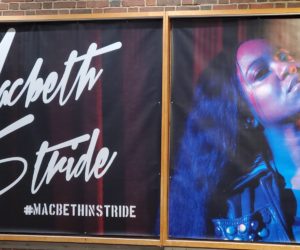I find it difficult to write a review without describing every minute detail that happened in the last show I saw. I seem to have a compulsion to give my input on everything possible. Sometimes a show just presents itself to me in such an engaging way that I can’t help but want to talk about all of it. Now, after seeing Macbeth in Stride at American Repertory Theatre (ART) in Cambridge, MA, this challenge has not gotten easier.
In the process of trying to concisely give my input, I have rewritten and rewritten this article far more times than I’d like to admit. There is just so much content here that I must share. Now, I’m finding it increasingly difficult to, as they say, “kill my darlings.”
But kill my darlings I must. The truth is, Macbeth in Stride is a fascinating, if perplexing show. From its intriguing premise (Macbeth taken from Lady Macbeth’s perspective with a feminist and progressive viewpoint, summed up best with the question, “What would Lady Macbeth say if she was given the voice, and what would she say about Shakespeare’s text?”) to its engaging rock score, I enjoyed every second of this piece.
I find it hard to believe that Whitney White was slated to put up this show in the 2019/20 season. After everything that happened between the beginning of the pandemic and now (especially regarding George Floyd’s murder and the Black Lives Matter demonstrations), this work feels as timely as ever.
However, what this production does best is what makes me (and many of my fellow audience members) leave the theatre with mixed feelings. That is, this is the first time in my mind that a production has utilized Bertolt Brecht’s alienation effect (A-effect) successfully.
Brecht, Back and Better Than Ever
Let’s explore the A-effect first. Many people who have studied, performed, directed, or produced theatrical works should be familiar with this term, but I find very few are attuned to the nuances that Brecht set out. While this is a concept that I’d love to explore more in detail at a later date, this is such a detailed topic that it might be best just to focus on the key elements.
In short, Brecht’s alienation effect seeks to distance the audience from the action occurring on stage so as to prevent the audience from developing an emotional connection with the actors and plot. This should, in turn, allow the audience to think critically about the decisions, emotions, and actions of the characters and to judge them accordingly. One other point that is worth mentioning is that Brecht desired that plays utilizing the A-effect consistently remind the audience of the fact that they are watching a theatrical piece, and not an actual event happening in front of them.
With Macbeth in Stride, however, the use of Brecht’s A-effect is just a part of the whole picture. The show’s engagement with the A-effect is due in large part to its contribution to an emerging model of theatre, which I call “academic theatre.” To my knowledge, currently only one other play exists which belongs to this genre, and that’s Dave Malloy’s Beowulf: A Thousand Years of Baggage.
Academic theatre is relatively new in the grand scheme of theatre models. However, I believe it to be an emerging model of theatre. Simply, a theatre model is a basic formula that a playwright uses to construct the framework of their production. Rodgers and Hammerstein most famously formulated their “book musical” model, with songs appearing after dialogue with the intention of furthering the plot through music. Academic theatre, however seeks to recontextualize a historical work through a modern lens, and through different perspectives than in the original text.
To do so, academic theatre productions talk directly to the audience with those new perspectives in mind, and typically utilize criticism as its primary jumping-off point. Because of this approach to narrative, this model typically elicits the A-effect in the general audience. In the case of Beowulf: A Thousand Years of Baggage, Malloy uses a literature conference as the framing device for the show. This reminds the audience that what they’re watching is a theatrical piece, not actual events occurring.
Macbeth in Stride takes this to the next level. Almost throughout the whole show, White, playing the role of “Woman” (who is, for all intents and purposes, Lady Macbeth; more on this at the end) and the Witches, played by Phoenix Best, Kira Sarai Helper, and Reggie D. White, talk directly to the audience about the action that is happening, has happened, or is about to happen.
White, as Woman, asks the audience critical questions about Shakespeare’s original text and what it means to be an “other” (anyone who is not a cis, heterosexual, white, male) when approaching Shakespeare’s works and iconic characters. Charlie Thurson, billed as “Man” (Macbeth), asks no questions and gets very little say in the overarching action (White’s discussion of the original text).
Interestingly, his presence reflects Macbeth’s original theatrical through-line, but is ever-so-subtly adapted to reflect Lady Macbeth’s presence in the original text. As White points out, Lady Macbeth’s first scene is not longer than two minutes, where she simply reads Macbeth’s letter. Likewise, Man’s first scene in this work is equally as short.
These changes in characterization reflect Macbeth in Stride‘s core questions: “We all know Macbeth. We all know Macbeth. But, then, who is Lady Macbeth? How did she get to be where and who she is? What drives her actions, and why is she ultimately driven to madness? Most importantly, who do we, as a theatrical community, allow to play Shakespeare’s women, especially Lady Macbeth, and why do we restrict Shakespeare’s roles?”
This is Not Your Traditional Theatrical Experience
The questions Macbeth in Stride asks are incredibly important. Any theatrical scholar, or even any actor, should be asking these questions of any work they put on.
However, instead of showing her answers to these questions, White decides in favor of talking to the audience about the nature of these questions. White tells the audience that these problems exist with Shakespeare’s works. She tells the audience—quite truthfully—that Shakespeare intended for his works to be performed only by cisgender, heterosexual, white males, and to be performed for a cisgender, heterosexual, white audience.
Here, White encourages her audience to think critically about these questions, yet when we, the audience, return to what most would consider the plot, all we are given is Shakespeare’s original, barely edited text. There is nothing new or contemporary (other than White’s hilarious interjections) added on to it.
These elements do not make Macbeth in Stride a bad show; far from it. Again, I quite enjoyed my time watching this piece. However, when creating a work designed to ask these types of questions, the traditional way of going about it is to weave it into a larger narrative.
Except, the rejection of tradition is precisely the point.
The “traditional” way of approaching these subjects does not work when the intention is for the audience to think critically about the questions posited. In the “traditional” model, most audience members are absorbed into the story and fail to consider the larger questions asked by the work (of course, that doesn’t mean that some will not come away with an understanding of the larger message and questions that the work asks).
However, Macbeth in Stride is the first time that I have left a theatre where everyone was talking about the content and questions asked. The mixed remarks about the work that many of my fellow audience members expressed is precisely due to their engagement with the topics at hand. They were left distanced from the show.
I can’t stress this enough: Macbeth in Stride is the production with the most masterful implementation of Brecht’s A-effect that I have seen.
Successfully Tackling Our Modern Shakespeare Problem
The questions Macbeth in Stride presents to its audience are important. Shakespeare didn’t intend for women to play his characters. With English theatres restricting female performers until at least 1660, long after Shakespeare’s death, he wasn’t writing shows with female performers in mind. Now, in the modern day, we still restrict who can play Shakespeare’s roles.
White points out that, as a BIPOC performer, she’s already restricted in the roles she is “allowed” to play, leaving Lady Macbeth as the only option left. Her point is correct: this should not be the standard.
After 2020’s demonstrations and numerous theatres committing to diversifying, we need more diversity with not only the shows we put on (and to ensure that diversity continues its momentum), but also with who we “allow” to perform.
As I left the theatre, I heard many people say, perplexed, that the show was “interesting,” or, “not my favorite,” or, “the worst part about it was having to wear masks” (which, can I say, get over yourself).
However, the commonality between all these people, my fellow audience members, was that they all were talking about the questions Macbeth in Stride raised. I have never experienced this before. Let me stress this: never, in the history of all the shows that I have been to, has a significant majority of the audience left the auditorium discussing the questions raised and relevancy of the piece.
I have a hard time believing that this is due to anything other than the A-effect at work. The response to the piece, emotionally, is mixed because the A-effect prevents the audience from engaging emotionally with the work.
We need more shows like Macbeth in Stride that seek to critically analyze older works while, at the same time, trying something new. Works of academic theatre are only just emerging, but I’m eager to see where they go.
When White produces her next four plays (also works that seek to recontextualize Shakespeare’s female characters through a modern lens), I will be reserving my seat in the theatre just so I can see how she takes this model further.
Afterword: Some Incredible Billing
I’m adding a little post-script here, just so I can touch upon the brilliant billing of White and Thurson. As with the rest of the show, Macbeth in Stride does something very clever.
In the show, Whitney White and Charlie Thurston do not play Lady Macbeth and Macbeth, respectively, as those watching the performance would be apt to believe. As I touched on before, they instead perform as “Woman” and “Man,” respectively.
Where most of the audience will explore these two characters as Lady Macbeth and Macbeth, White cleverly removes their actual, implied identities, which should, in theory, reshape how the audience views these characters (of course, this might not work in practice; I doubt very many people took note of this billing in the play’s digital program).
Without the name associating them with Shakespeare’s original text, “Woman” and “Man” now act independently and free from any suggestion from the source material. It is my belief that White intended the audience to think critically about these characters’ actions and motivations, and, in doing so, she removed their identities to add another layer of distancing for the audience from the work.
Have I stressed enough that this show is brilliant?




